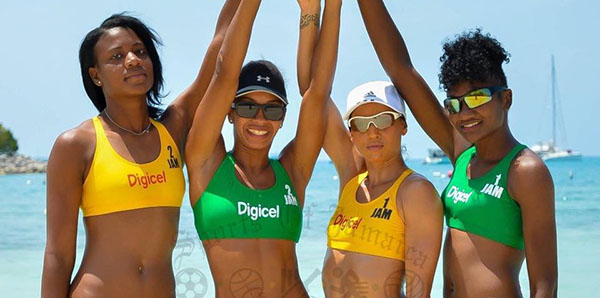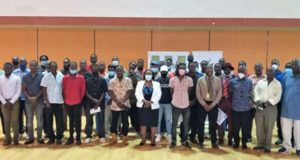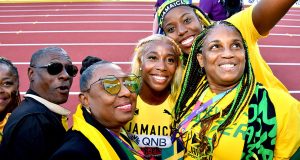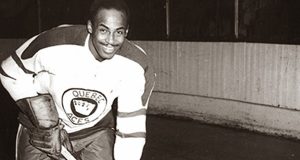Photo above is of Team JAMSoul (from left to right) Sashalee Wallen, Danielle Perry, Alicia Malcolm-Anderson and Kai Wright. Photo from Team JAMSoul’s Facebook page.
By Lekan Afolabi
PRIDE Sports Columnist
Beach volleyball is relatively a new sport for many Caribbean countries – unlike indoor volleyball, the beach variety of the sport is in its infancy.
For athletes from Caribbean countries playing this exotic sport, the road to Rio de Janeiro, Brazil, for the 2016 Summer Olympic Games is a gruelling one, paved with gallons of sweat and sand.
In order for any of the competing Caribbean teams to qualify, they would have to excel in a series of continental competitions which will then put them on the qualifying path.
For Jamaica, the path to Rio began brilliantly as team JAMSoul became the first team to ever win Gold in beach volleyball for the country.
One of the team JAMSoul’s key athletes is Alicia Malcolm-Anderson – one might say that her road to Rio is filled with joy and fulfilment to finally be able to represent Jamaica. The 37-year-old was born in New Zealand, birthplace of her father and she has a Jamaican mother.
I had the opportunity to speak with Malcolm-Anderson on the phone from her Toronto home, where she lives with her husband and son.
Malcolm-Anderson and her parents moved to Montego Bay, Jamaica when she was a baby. The family stayed in the birth-country of her mother, Dorothy Bowen, who was born in Spanish Town and grew up in Cold Spring in Hanover. The arrangement only lasted until Malcolm-Anderson’s infant years before they moved to Scotland, and then to New Zealand.
Malcolm-Anderson’s parents had every intention to move back to Jamaica but that did not come to fruition as the family settled in Auckland, a city north of New Zealand’s North Island.
Becoming an athlete was basically in her blood.
Malcolm-Anderson explained that her mother, who she credits as one of the reasons why she wanted to play for Jamaica, had lung cancer later on in life and also became an athlete around that time. She expounded on the sacrifice her mother made for her and their family.
“My mother put her personal life on hold to raise a family. At 42-years-old, she became an athlete and ran in many marathons.” Malcolm-Anderson said that her mother proved to her that anything is possible if you have the passion and drive to overcome obstacles.
Adding to the athletic gene pool is that fact that Malcolm-Anderson is the first cousin of the great track and field athlete, Merlene Ottey. Malcolm-Anderson remembers when she was very young and used to watch her cousin on the television as Ottey competed on international competitions.
Those moments, as she reminisced, were the defining moments that made her want to run track – much like her very accomplished cousin. And indeed, Malcolm-Anderson did run track as a youth but that eventually gave way to volleyball.
Part of the memory from which Malcolm-Anderson recounts is that of her father, Dr. John Malcolm, taking pictures of the television screen almost every time that Ottey was competing for Jamaica. Further in our conversation, Malcolm-Anderson revealed that her father was also a runner but not to the extent of her mom.
Dr. Malcolm had recently been honoured with the Royal Australasian College of Physicians (RACP) Rural and Remote Medal, a prestigious and international award given for outstanding and continued support to clinical service in rural and remote areas.
Suffice to say that Malcolm-Anderson was heavily influenced by her parents, who achieve and work passionately in their respective endeavours.
In addition to her parents and cousin, Malcolm-Anderson mentioned that another source of inspiration is a cause that is important to her. She is working to help improve the overall profile of SickKids Caribbean.
“I’m working to raise awareness for SickKids Caribbean. Both my parents are in the medical field to support children and I want to help to continue that legacy through sports.”
According to Malcolm-Anderson, SickKids Caribbean is based on the SickKids Toronto model, and is part of the Sick Kids Foundation. The Caribbean initiative provides health equality to six Caribbean countries – Jamaica, Barbados, The Bahamas, Trinidad and Tobago, Saint Vincent and the Grenadines, and Saint Lucia – and helps to fund research for cancer and blood disorders.
The opportunity for Malcolm-Anderson to continue her parent’s legacy through sports does to not end with SickKids Caribbean. She is also involved with, and recently attended, the Ontario Black History Society Leaders of Tomorrow event.
The Ontario Black History Society (OBHS) is a non-profit registered Canadian charity, dedicated to the study, preservation and promotion of Black History and heritage.
Malcolm-Anderson spoke to the youth in attendance. She told them to follow their “passions purposefully – purposeless passions have a dead-end or, maybe I should say, they have a short shelf life.”
For Malcolm-Anderson, her purposeful passion to one day play for Jamaica meant she journeyed through playing indoor and beach volleyball for New Zealand; she is very proud of this part of her history and accomplishments while representing her father’s country.
Playing for her mother’s home country took some time to materialize. She had been writing letters about her intention to represent Jamaica in beach volleyball for more than 10 years. Eventually technology allowed the process to happen seamlessly.
After some Google searches on how to connect with someone involved in Jamaica’s small beach volleyball community, Malcolm-Anderson came out of retirement, two years ago, and became one of the founding members of team JAMSoul.
Now she is fulfilling her dream by representing Jamaica as they play in a series of continental competitions which sets them on the qualifying path. There are two ways to qualify for Rio in beach volleyball – one is through the Fédération Internationale de Volleyball (FIVB) where the Jamaicans must accumulate points over a number of competitions and years leading up to the Olympics.
The other path of qualification is through the North, Central America and Caribbean Volleyball Confederation (NORCECA) Beach Volleyball Continental Cup. This tournament sees the winner automatically qualifying for Rio 2016.
Regardless of the path to Rio 2016, it is very evident, in speaking with Malcolm-Anderson, that she believes they can overcome all obstacles and competition and make Jamaica proud in the process.
So what’s the biggest competition that might pose as an obstacle in reaching Rio?
“None! We really don’t have obstacles. We (speaking about the rest of her JAMSoul teammates) live in different places. I guess the only thing is to find time for team building – be in each other’s space and practice together.” She added, “We are having a team-building camp in Toronto in the coming weeks.”
The rest of her teammates will need some funding assistance to come down to Toronto so they can train, practice and also cover player’s expenses. A ‘gofundme’ account will be set up soon which will help bring their plan to realization.
Malcolm-Anderson’s husband, Steve Anderson, is an Olympic Gold Medal coach and is also the Head Coach for Canada’s High Performance Beach Volleyball Programs. He wrote a book which she cites as another source of inspiration and motivation.
The book, titled The Challenge Makes The Champion, delves into how athlete’s and people in general can use obstacles to trampoline themselves to another level of success.
It seems to me that this concept is one which Alicia Malcolm-Anderson has fully mastered.
 Pride News Canada's Leader In African Canadian & Caribbean News, Views & Lifestyle
Pride News Canada's Leader In African Canadian & Caribbean News, Views & Lifestyle





